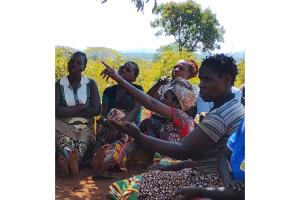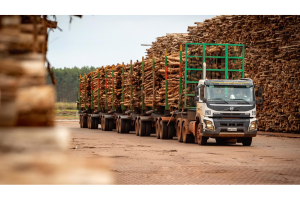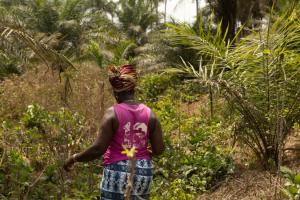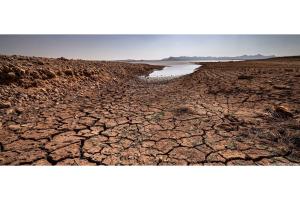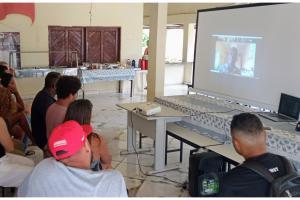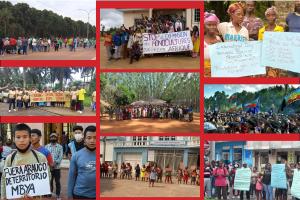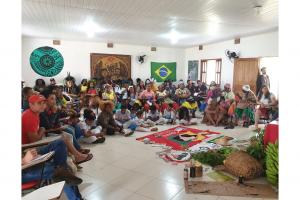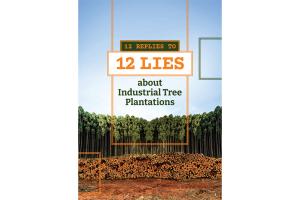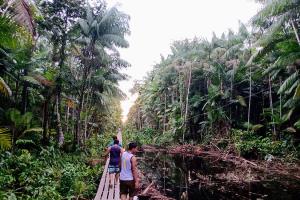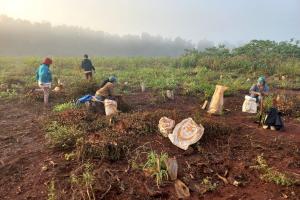Pulp and Paper
Large-scale tree monocultures to produce pulp and paper, along with the infrastructure and pulp mills that come with these plantations, have been expanding onto communities’ fertile lands. They have destroyed forests and grasslands, especially in Latin America, Asia and Southern Africa. The species used are fast-growing and not native to these countries. They include varieties of eucalyptus, acacia and pine trees.
Bulletin articles
24 October 2024
Besides the direct impacts on communities’ lives, eucalyptus monoculture plantations represent absurd and obscene inequality. A group of 45 community people with whom we spoke was shocked to learn that it would take them 2,300 years of non-stop work to collectively earn the same amount that a single Portuguese family, one of the owners of the plantation company they work for, earned in one single year from the profits of their shares in the company.
Bulletin articles
28 June 2024
How many tree plantations are there, and how big are they? In what regions and countries are they located? What are the differences among the various "players" who are directly involved in implementing tree plantations for the carbon market? This article presents figures and information seeking to answer these and other questions.
Bulletin articles
27 June 2024
Behind every tree plantation developed for carbon offsets, there are external agents seeking to profit from increased control over the land. And while they all have the same colonial approach, these plantations can vary widely: they can be large-scale monocultures or schemes with smallholder farmers; they can include exotic species or native species; and some of them may even exist on paper only.
Bulletin articles
19 December 2023
For decades, Mapuche communities have been resisting the impacts of a forestry model based on large-scale monoculture plantations. In this interveiw, Pablo Reyes Huenchumán, spokesperson for the Paillakawe community, explains how they organize, and what the main challenges are in the struggle to recover their territory and maintain their culture.
Bulletin articles
25 October 2023
More than seven percent of Uruguay's territory is covered with monoculture tree plantations. A handful of companies have been behind this massive expansion—which has occurred mostly over watersheds and prairies—,with devastating consequences. This year, almost half of the urban population had no access to drinking water—an imminent warning of the drastic change that is needed for Uruguay to maintain its water.
Bulletin articles
25 October 2023
Exchanges between activists put the voices of those who fight to defend their territories at the center of the conversation. In September, members of communities from Brazil and Mozambique united their struggles and connected their histories once again, helping to strengthen solidarity in the fight against industrial tree plantations.
Bulletin articles
11 October 2022
Industrial tree plantations have always been about corporate control over community fertile lands. The monoculture model inherently endangers communities’ survival, food sovereignty and autonomy, deepens the violence of patriarchy and racism while enforcing the same destructive and oppressive way of organizing land (and thus, people) as the one enforced during the colonial era.
Bulletin articles
11 October 2022
The network that brings together movements, organizations and communities in the fight against tree plantations met in the Far South of the State of Bahia. This September 21st, it once again denounced the impacts of this violent and unjust model, which is based on large-scale plantations mostly for pulp export.
Bulletin articles
11 October 2022
On the occasion of September 21st, 2022, the International Day of Struggle Against Monoculture Tree Plantations, WRM launched the briefing “12 Replies to 12 Lies about Industrial Tree Plantations”.
Bulletin articles
12 September 2022
The quilombola communities of Sapê do Norte, Brazil, are living a violent process with the expansion of large-scale eucalyptus monoculture. After many hardships, they started a process to take back their water and land. And the struggle to take back what is theirs continues. WRM talked to two quilombola activists to reflect on this difficult but fertile process of resistance.
Bulletin articles
16 June 2022
Fossil fuels are at the root of the climate chaos – but the conditions for this crisis have been created by the interconnections and dependencies between colonialism, racism, patriarchy and class exploitation. To address climate chaos, therefore, it is necessary to address the unequal relationships of power upon which a fossil-fuel dependent capitalism is based.
Bulletin articles
16 June 2022
The Independent Producers of Piray (PIP) in Misiones, Argentina was formed in 2005 to stop the advance of multinational Arauco’s pine tree monocultures and reclaim the land. WRM spoke with Miriam Samudio, a key member of the PIP family, to reflect on the process of the struggle and the lessons learned.
